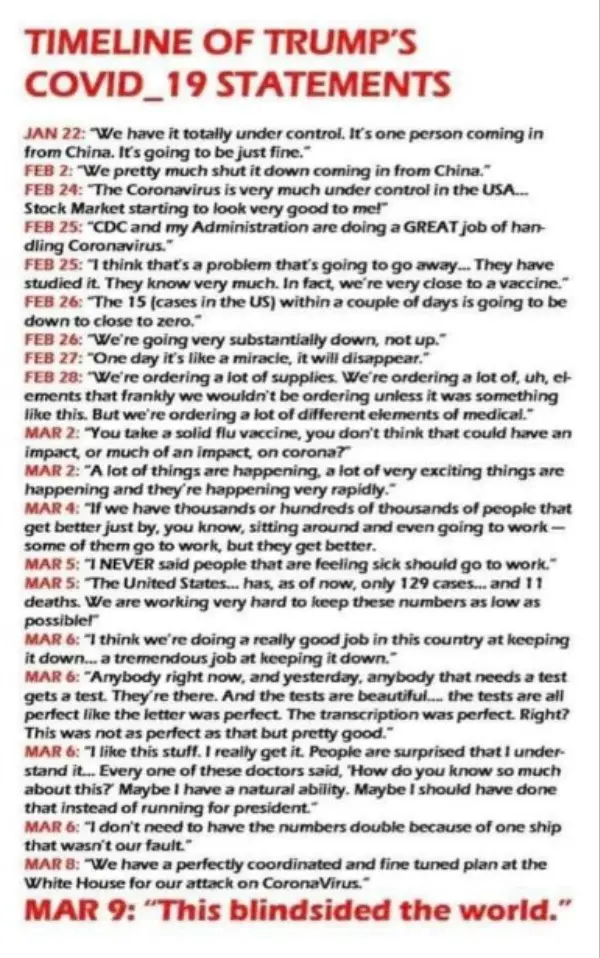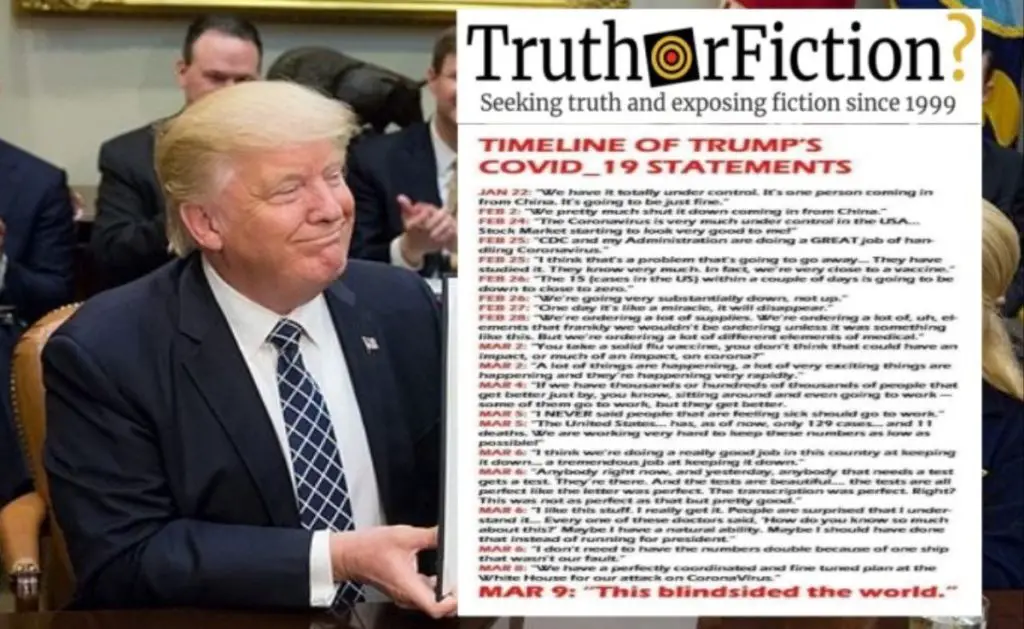As criticism spread against United States President Donald Trump’s administration for its response to the COVID-19 pandemic in mid-March 2020, one graphic disseminated on social media listed his multiple attempts to downplay the disease:

In this case, the graphic is completely accurate. The various statements are correctly attributed to Trump, and each has been verified in independent timelines compiled by news outlets.
- January 22: “We have it totally under control. It’s one person coming in from China, and we have it under control. It’s going to be just fine.” Taken from a Trump interview with CNBC.
- February 2: “We pretty much shut it down coming in from China.” Taken from an interview with Fox News.
- February 24: “The Coronavirus is very much under control in the USA … Stock Market starting to look very good to me!” Taken from Trump’s Twitter.
- February 25: “CDC and my Administration are doing a GREAT job of handling Coronavirus.” Taken from Trump’s Twitter.
- February 25: “I think that’s a problem that’s going to go away.” Taken from a press conference Trump delivered in India.
- February 26: “The 15 [US COVID-19 cases] within a couple of days is going to be down to close to zero”; “We’re going very substantially down, not up.” Taken from a press conference led by Trump and Vice President Mike Pence.
- February 27: “One day it’s like a miracle, it will disappear.” Taken from remarks Trump gave during an event commemorating Black History Month.
- February 28: “We’re ordering a lot of supplies. We’re ordering a lot of — a lot of elements that, frankly, we wouldn’t be ordering unless it was something like this. But we’re ordering a lot of different elements of medical.” Taken from remarks Trump made to reporters.
“We’re ordering a lot of supplies. We’re ordering a lot of, uh, elements that frankly we wouldn’t be ordering unless it was something like this. But we’re ordering a lot of different elements of medical.” — Trump on the coronavirus pic.twitter.com/id6YLzbmRE
— Aaron Rupar (@atrupar) February 28, 2020
- March 2: “You take a solid flu vaccine, you don’t think that could have an impact, or much of an impact, on corona?”; “And we’re going to be very successful. A lot of things are happening. A lot of very exciting things are happening, and they’re happening very rapidly.” Trump made these remarks during a public meeting with leaders from pharmaceutical companies.
- March 4: “If we have thousands or hundreds of thousands of people that get better just by, you know, sitting around and even going to work — some of them go to work, but they get better.” Taken from another Trump interview with Fox News.
- March 5: “I never said people that are feeling sick should go to work.” Taken from Trump’s Twitter.
- March 6: “I think we’re doing a really good job in this country at keeping it down … a tremendous job at keeping it down”; “Anybody right now, and yesterday, anybody that needs a test gets a test. They’re there”; “I like this stuff. I really get it. People are surprised that I understand it”; I don’t need to have the numbers double because of one ship that wasn’t our fault.” Taken from a press conference Trump gave at the Centers for Disease Control.
- March 8: “We have a perfectly coordinated and fine tuned plan at the White House for our attack on CoronaVirus.” Taken from Trump’s Twitter.
- March 9: “This blindsided the world.” Taken from Trump’s remarks at a press conference.
A video with similar content, posted by writer Lindsay Holst and featuring audio of several of Trump’s remarks alongside a graph showing the spread of the disease, has been shared thousands of times on Twitter:
57 days later. pic.twitter.com/umsfZHyBuo
— Lindsay Holst (@LindsayLHolst) March 17, 2020
On March 17 2020, journalists asked Trump why his tone had shifted so quickly and dramatically regarding the epidemic. He told reporters, “I’ve always known this is a real — this is a pandemic. I felt it was a pandemic long before it was called a pandemic. I’ve always viewed it as very serious.”
- A Complete List of Trump's Attempts to Play Down Coronavirus
- A timeline of Trump playing down the coronavirus threat
- Fact Check: Trump Falsely Claims US Has 'Tremendous Control' of the Coronavirus
- Donald Trump says he would prefer Grand Princess cruise ship passengers stay on ship
- Trump Says he Trusts China's Xi on Coronavirus and the US Has It 'Totally Under Control
- Interview: Sean Hannity Interviews Donald Trump at Mar-a-Lago - Part 1 - February 2, 2020
- Trump Says Coronavirus 'Under Control' in US, Problem Going to 'Go Away'
- Remarks by President Trump, Vice President Pence, and Members of the Coronavirus Task Force in Press Conference
- Remarks by President Trump in Meeting with African American Leaders
- Trump's baffling coronavirus vaccine event
- Remarks by President Trump Before Marine One Departure
- Remarks by President Trump and Members of the Coronavirus Task Force in Meeting with Pharmaceutical Companies
- Trump Floats His Own Coronavirus Hunches on 'Hannity'
- Remarks by President Trump After Tour of the Centers for Disease Control and Prevention
- Coronavirus 'blindsided the world': Trump
- Revising History, Trump Makes Bizarre Claim About Pandemic Foresight

